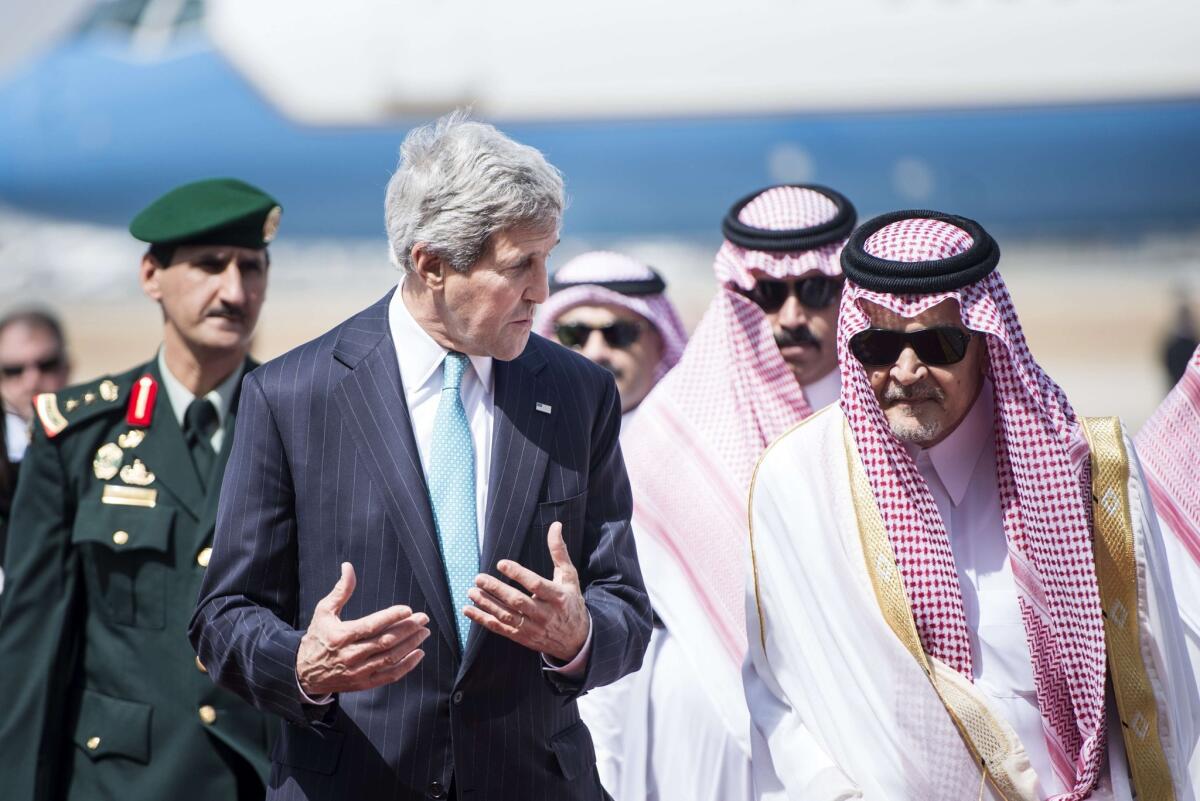Shake-up of U.S.-backed Syrian rebel group ordered

- Share via
Reporting from Amman, Jordan — As the Obama administration seeks $500 million in additional aid for Syrian rebels, a leading figure of the major U.S.-backed Syrian opposition coalition has ordered the disbanding and complete restructuring of the group’s military wing.
The shake-up is the latest sign of disarray within the Syrian National Coalition, the exile-based opposition umbrella group backed by Washington and its allies. The Obama administration has touted the coalition as an alternative to the government of Syrian President Bashar Assad and has backed the group with funds and equipment.
Ahmad Tomeh, prime minister of the coalition’s opposition government, ordered the dissolution of the Supreme Military Council, which oversees the Free Syrian Army, the affiliated rebel faction fighting in Syria. He referred members of the military command to a financial and administrative oversight committee “for investigation.”
A statement late Thursday from Tomeh did not specify any charges of wrongdoing.
The recently appointed opposition military chief, Brig. Gen. Abdullah Bashir, was fired in the overhaul.
The move was meant in part to put the military campaign directly in the hands of Syria-based commanders, Tomeh said Friday in an interview with Al Arabiya, the Saudi-owned news channel.
The Syrian opposition group has long faced complaints that its leaders spend too much of their time in five-star hotels in Turkey and in allied Persian Gulf states, although Bashir was officially said to have been based in Syria.
Most commanders “no longer have a presence on the ground in Syria and live on Turkish soil,” said Tomeh, a dentist with a long history in Syrian opposition circles.
“A new force on the battlefield deserves to be represented,” Tomeh told Al Arabiya.
The overhaul drew condemnation from the ousted military leadership. In a statement, the former commanders described the decision as “irresponsible” and a “gross legal mistake.”
The shake-up is the latest upheaval in the ranks of the U.S.-backed Syrian opposition. U.S. officials say they provide aid only to “moderate” rebel groups that reject Islamic extremism, support retaining a secular governing structure in Syria and respect the rights of Syria’s minority groups.
The Free Syrian Army has long been a major disappointment to its overseas sponsors. On the battlefield, its forces have been eclipsed by various hard-line Islamist opposition factions, including Al Qaeda-style groups. It has never been clear how many troops fight under the FSA banner or report to its command structure.
Formed in December 2012, the Supreme Military Council aimed to bring together disparate rebel groups under a unified command that would plan and execute military operations as well as oversee the distribution of weapons and funds. U.S. officials applauded the move.
Its creation was in part an attempt to reassure supporters in the United States and elsewhere who were alarmed about the rising influence of Islamist fighting formations, including the Al Qaeda-affiliated Al Nusra Front and its arch-rival, the Islamic State of Iraq and Syria, or ISIS.
But the U.S.-backed Syrian opposition has complained repeatedly that Islamist factions are better funded and have superior arms.
A major blow to the pro-U.S. “moderate” rebel movement came in December, when Islamist rebels seized stocks of U.S.-supplied “non-lethal” supplies that had been stored in warehouses along the Syria-Turkey border. Washington cut off some new aid deliveries for several months. Critics argue that there is no guarantee that weapons and other lethal aid provided to “moderate” rebels will not fall into the hands of Islamist militants.
Sweeping advances this month in Iraq by ISIS may have prompted the White House to bolster support for the Syrian opposition.
On Thursday, the Obama administration said it was asking Congress for $500 million in aid to train and equip “appropriately vetted elements of the moderate Syrian opposition,” according to a statement from the National Security Council.
Special correspondent Bulos reported from Amman and Times staff writer McDonnell from Beirut.
Follow news out of the Middle East with @mcdneville
More to Read
Sign up for Essential California
The most important California stories and recommendations in your inbox every morning.
You may occasionally receive promotional content from the Los Angeles Times.











